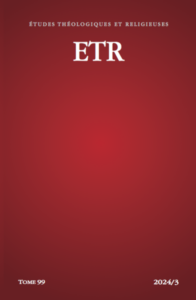Cette thèse interroge l’histoire politique des réformés français au début du xviie siècle au prisme de la notion de liberté : liberté comme défense des acquis juridiques conférés par le régime de l’édit de Nantes, mais aussi et surtout comme capacité d’action, d’appropriation de modes d’action et de reconfiguration constante du cadre au sein duquel celle-ci se déploie. Loin de considérer les huguenots comme les victimes passives d’une « France toute catholique », elle les pense donc comme des acteurs politiques, au sens où ceux-ci sont capables d’investir et de penser leur action politique, et d’initier celle-ci au sein d’une relation avec le pouvoir royal en pleine reconfiguration au sortir des guerres de Religion. Cette capacité d’agir est analysée en deux temps : nous interrogeons d’abord les caractéristiques qui fondent cette liberté d’action dans le contexte du xviie siècle, en particulier dans le cadre du régime de l’édit de Nantes, à travers une étude de la place accordée aux institutions, à la mémoire, à l’union et au langage dans leurs pratiques. Nous étudions ensuite la mise en pratique de cette liberté politique, en interrogeant les évolutions du parti huguenot, du rapport aux institutions, à la noblesse, aux stratégies langagières à la suite de la mort d’Henri IV. Enfin, nous consacrons un épilogue à la mise à mort de cette culture politique : la fin du parti huguenot n’est pas le fruit de dissensions internes, mais celui d’une volonté politique qui cherche spécifiquement à attaquer cette liberté, et se construit, dans une certaine mesure, par opposition avec elle.
Phrase : La thèse étudie l’histoire politique des protestants français à l’époque moderne autour de la question de la liberté.
Mots-clés : protestantisme français, réformés, liberté, histoire politique, guerres de Religion, édit de Nantes, xviie siècle, langage
History of a freedom in modern France. Protestants, politics and the monarchy (c. 1598-c. 1629)
This Ph.D. dissertation analyses the political history of the French reformed church in the early seventeenth century through the prism of the notion of liberty: liberty as the defense of the legal gains conferred by the regime of the Edict of Nantes, but also as the capacity for action, as appropriation of modes of action and as constant reconfiguration of the framework within which this action took place. Far from seeing the Huguenots as passive victims of an “all-Catholic France”, they are analyzed as political actors, in the sense that they were capable of investing in and thinking about their political action, and of initiating it within a relationship with royal power that was being reconfigured at the end of the Wars of Religion. This ability to act is analyzed in two stages: firstly, we examine the characteristics that underpin this freedom of action in the context of the seventeenth century, and particularly the regime of the Edict of Nantes, through a study of the place accorded to institutions, memory, union and language in their practices. We then look at how this political freedom was put into practice, examining changes in the Huguenot party, its relationship with institutions, the nobility and language strategies following the death of Henri IV. Finally, we devote an epilogue to the death of this political culture: the end of the Huguenot party was not the result of internal dissension, but of a political will that specifically sought to attack this freedom, and was built, to a certain extent, in opposition to it.
Keywords : French Protestantism, Reformed, freedom, political history, Wars of Religion, Edict of Nantes, 17th century, language
p. 503-516
